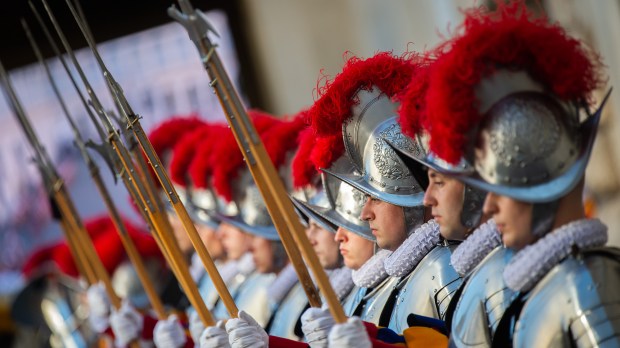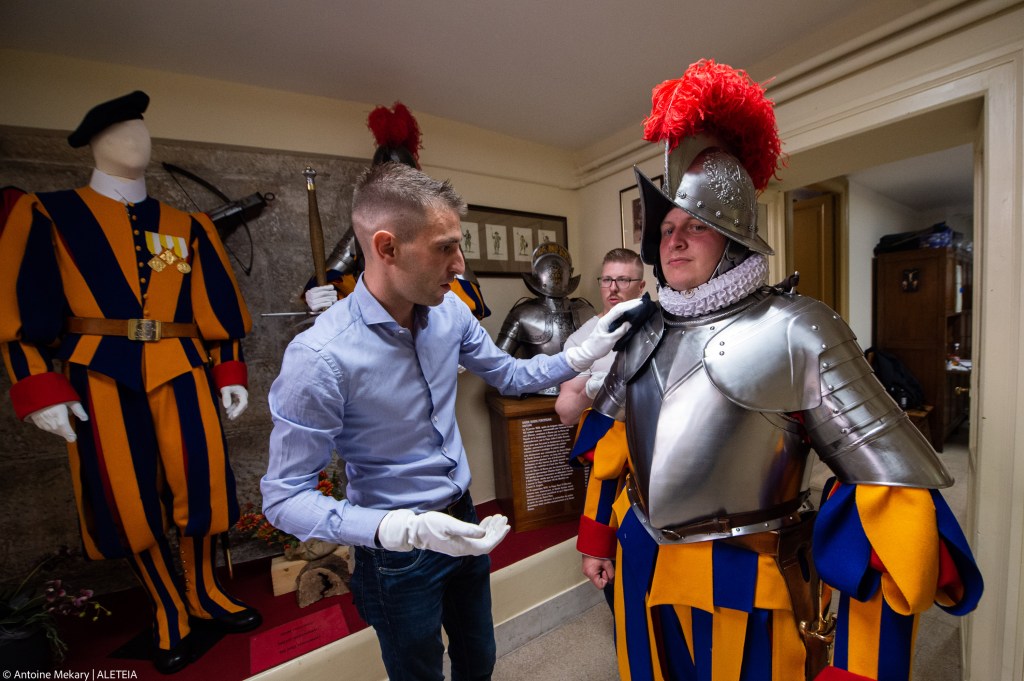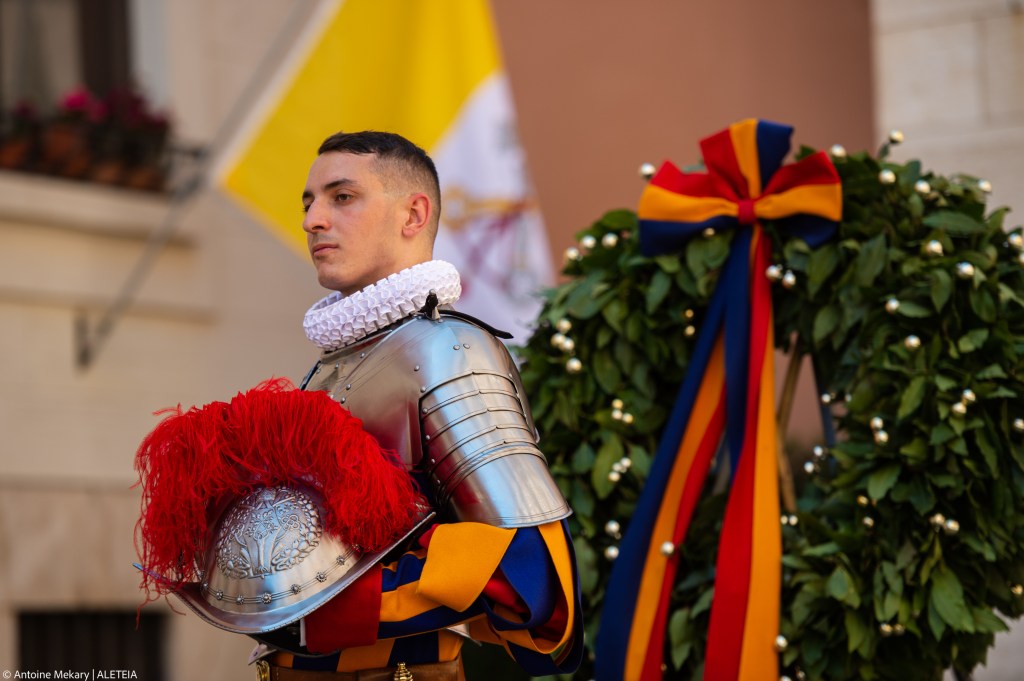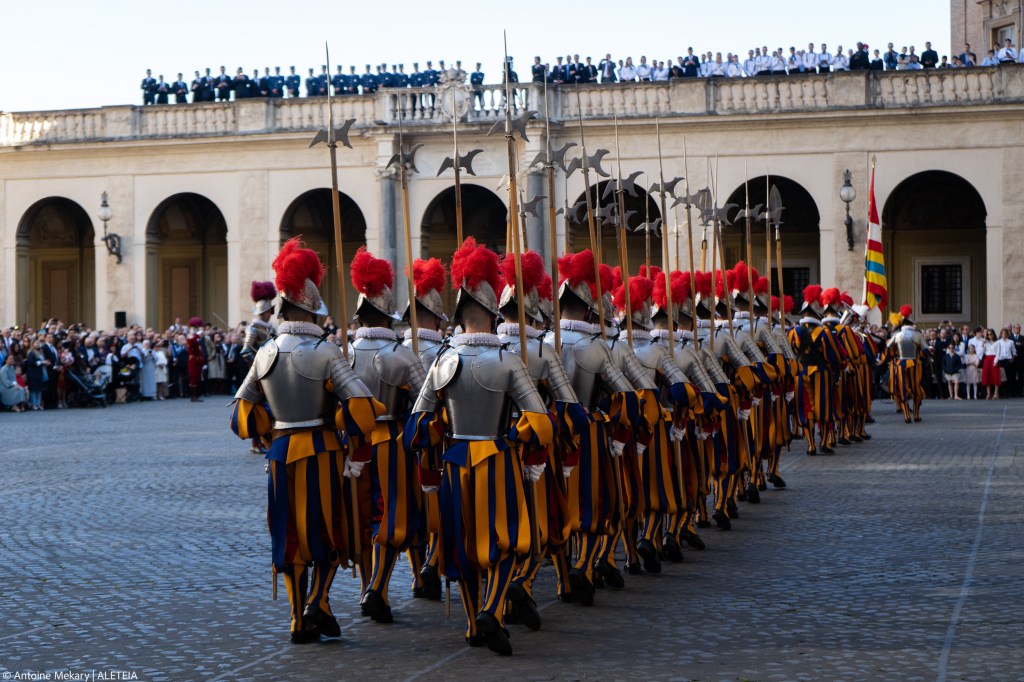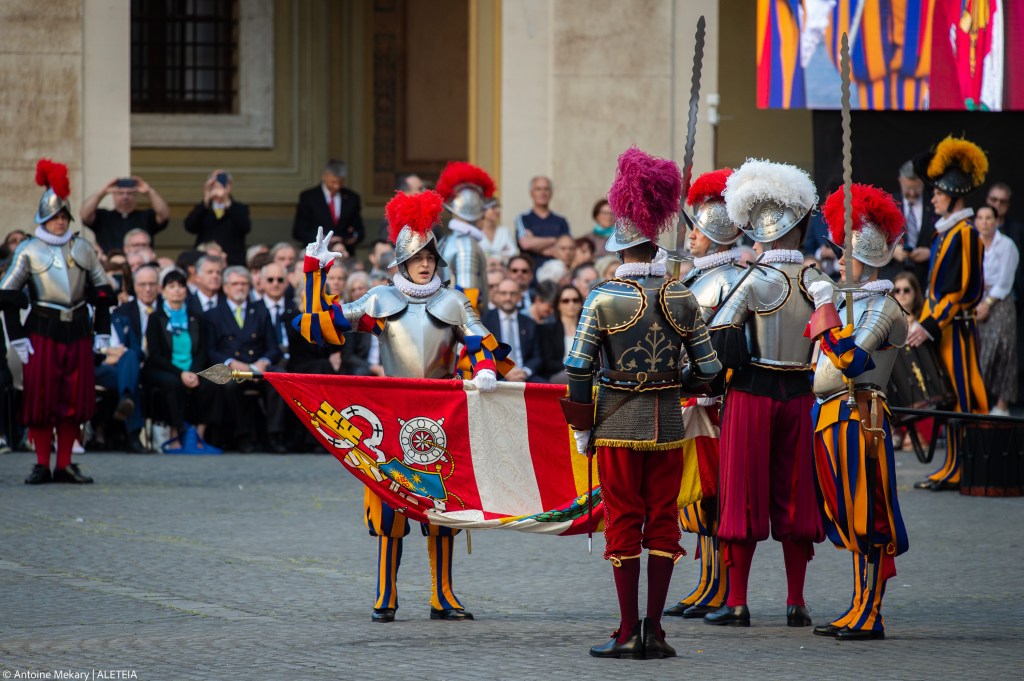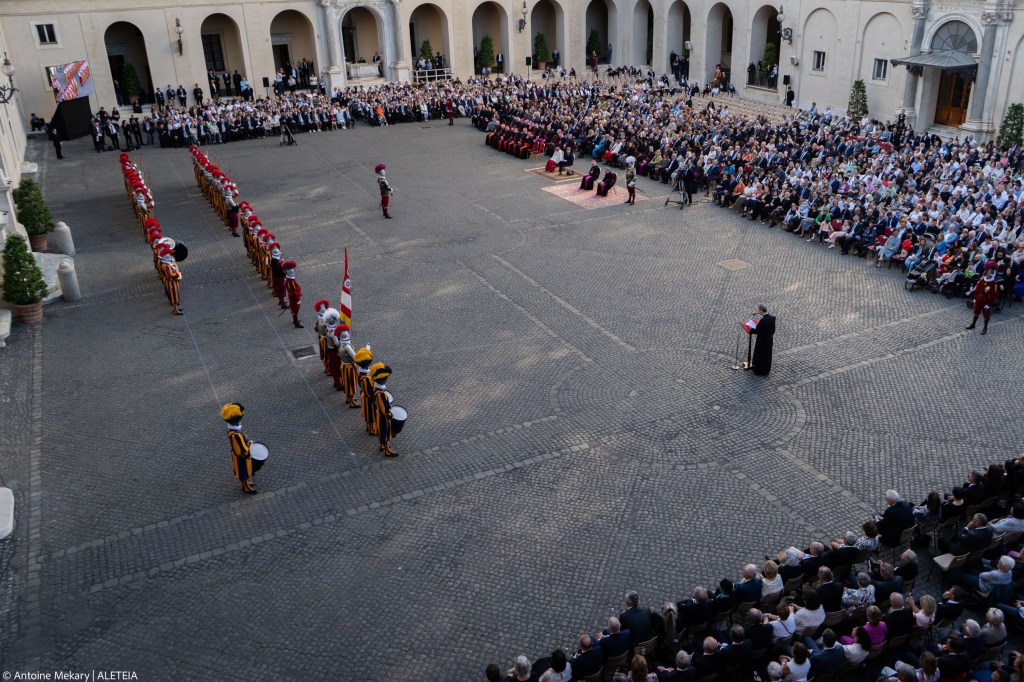On May 6, 2023, at the Vatican, 23 new Swiss Guards joined the ranks as they took an oath to serve Pope Francis. This day, marking also an important anniversary for the oldest and smallest army in the world, was filled with excitement as the new recruits had a chance to meet with the Pontiff in the morning, before participating in the traditional swearing-in ceremony in the afternoon. I.MEDIA takes you through these fascinating events.
“This occasion is, once again, a welcome opportunity to express my appreciation for the willingness and commitment with which, through your activity, you bear witness to fidelity to the Successor of Peter,” Pope Francis told the new guards and their family members during the audience. He said the Pontifical Swiss Guard is like “a large family” and thus “an environment of human and Christian formation for all.”
“In the faces of those you approach every day, be they members of the Roman Curia or pilgrims and tourists, you see many invitations to recognize and share God’s love for each one,” the Pope encouraged.
“Dear Swiss Guards, do not forget that the Lord walks with you: he is always by your side in calm moments and in those of difficulty.”
“A gift to thank my parents”
Martin, a 21-year-old Guard from the Swiss canton of Valais, was one of the 23 new recruits participating in the events on May 6. He spoke about his decision to join the world’s smallest army and his excitement at bringing his family to meet the Pope.
“I don’t have any ancestors in the Guard, but I am moved to be part of this long tradition,” he said. Martin had already been serving at the Vatican for 11 months and would now be part of the latest class to join the world’s oldest army, founded by Pope Julius II in 1506.
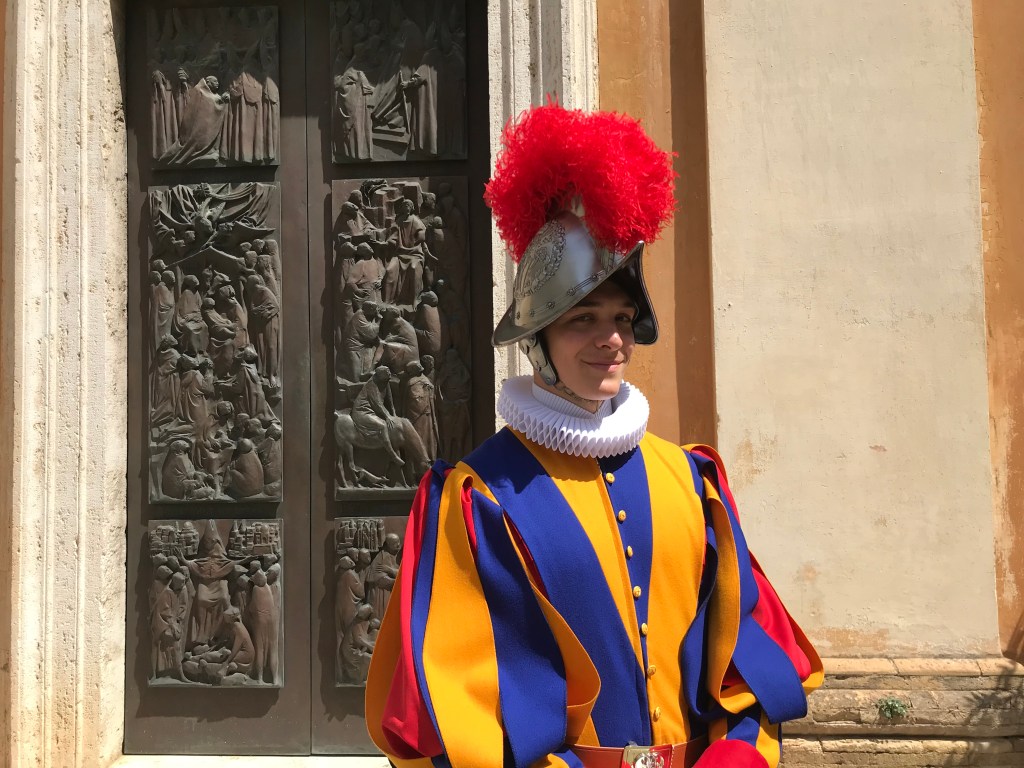
“The oath I’m taking today is a commitment that I’ve had time to meditate on during my service hours,” he said. For Martin, joining the Swiss Guard was also an opportunity to grow in his faith. “Having a chapel 100 meters from my room is unique,” he explained smiling, adding that the army also has a chaplain.
During the private audience Pope Francis took the time to greet the guards and their families personally. “The Pope was able to say a few words to us … I was proud because my parents have given me many things since I was born. And to be able to give them the opportunity to meet the Holy Father filled me with joy. It was like a gift to thank them for what they mean to me,” Martin said.
Martin’s journey
Martin’s attraction for the Swiss Guards began when he was a young boy. He remembers watching the traditional Corpus Christi processions in his canton, where scouts, altar servers, and former Swiss Guards marched every year. In 2019, during a family trip to Rome he visited the Swiss Guard’s barracks. Then in 2021, one of his good childhood friends joined the Guards. “He told me what he was living through and explained that it was accessible. I was looking for a service that would be meaningful,” says Martin.
On June 1, 2022, Martin joined the army with the most famous uniforms in the world, after doing a year of military service in Switzerland. Along with him, 22 other guards from the various Swiss cantons also joined. Martin, who already spoke French and German, had to learn Italian, especially to be able to take on jobs related to tourists, such as that of guarding the Saint-Anne gate, one of the main accesses to the Vatican.
Gradually, Martin was trained for service. The Swiss Guards have 5 missions to fulfill: first, protecting the Pope and his residence and then also accompanying him during his travels. Then, guarding the official entrances to the Vatican City: a difficult and demanding job, which also requires mastering a centuries-old ceremonial. Lastly, Swiss soldiers have the duty of protecting Cardinals during the vacancy of the Apostolic See, a mission that only a few veterans honored in 2013, as most Guards leave the barracks after 26 months of service. Martin still has 15 months left, before being able to leave.
The traditional swearing-in ceremony
Every year the traditional swearing-in ceremony of the new Swiss Guards occurs on May 6, a significant day for the army. During the Sack of Rome in 1527, 147 Swiss Guards died to protect Pope Clement VII’s life from Charles V’s troops. The ceremony this year was done in the presence of Archbishop Edgar Peña Parra, Substitute of the Secretariat of State, as the Pope’s representative.
The ritual is immutable. In the Vatican’s Saint Damasus courtyard, one by one the guards advance in a choreographed routine to the flag and shout their loyalty to the Pope. With their left hand on the flag and the three fingers of their right hand raised to the sky, the young soldiers swear to faithfully observe the oath that binds them to the Argentine pontiff and his legitimate successors, even if it means losing their lives. Thus, 23 times and in four different languages – French, German, Italian and Romansh – the sound of their commitment resounded in the elegant walls of the Apostolic Palace.
A new addition was added to the ritual this year. Between each performance, the 2000 or so people who came to attend the event – mostly families and friends – were allowed to applaud: A departure from the ceremonial that could well become a tradition, commented an amused Swiss Guard.
A Swiss band welcomed the guests to the courtyard in the heart of the Apostolic Palace to the sounds of popular music. For example, a variation of “Don’t Stop Me Now” by the British band Queen was played and also “Can’t Help Falling in Love” by Elvis Presley. However, the solemnity of the occasion returned when the trumpets sounded. Under Rome’s blue sky the Swiss Guards entered the courtyard, introduced by the drums.
Representatives from Switzerland
In front of the Swiss delegation led by Vice President Viola Amherd, the Guard Commander Christoph Graf urged the young recruits to become “authentic” men, relying on the help of God and their fellow man. The chaplain of the 125-man army emphasized how the time spent serving in the Guard could also be a time to get to know the Church and Jesus Christ better.
Other Swiss personalities present in Rome included the President of the National Council, Martin Candinas, the President of the Council of States, Brigitte Häberli-Koller, and the head of the Swiss Army, Corps Commander Thomas Süssli. The President of the Swiss Bishops’ Conference, Bishop Felix Gmür, was also present. Swiss Cardinal Kurt Koch, prefect of the Dicastery for the Promotion of Christian Unity, was also present, along with six other Cardinals who came to attend the event.
